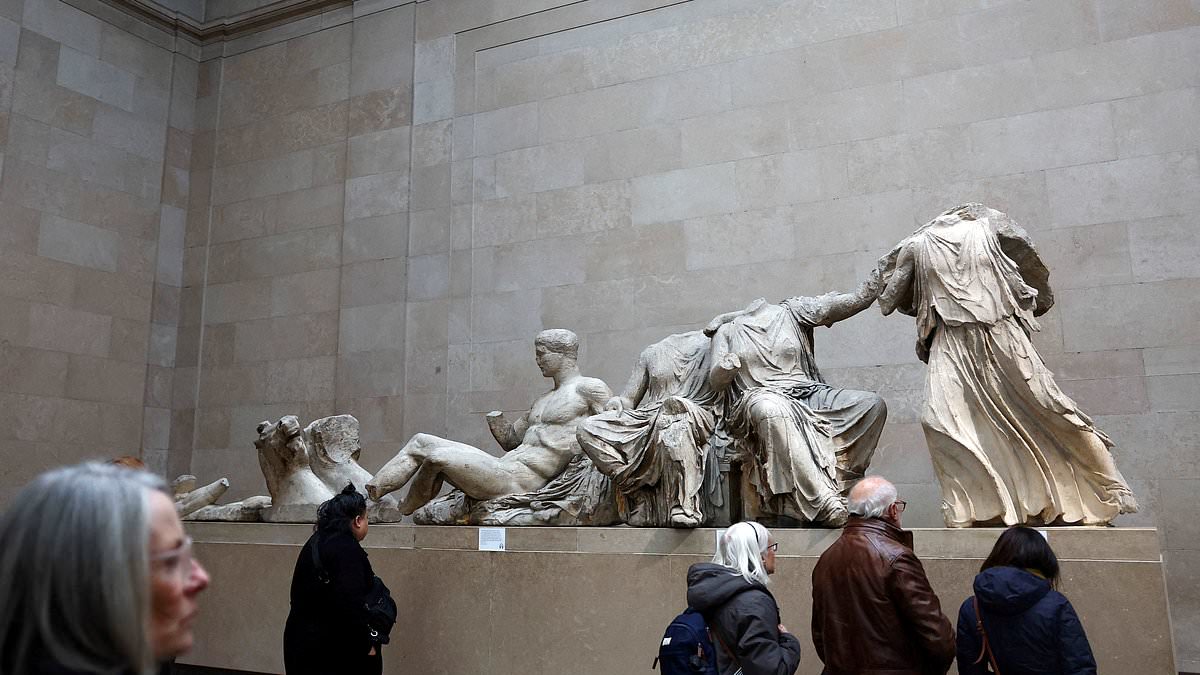A deal for the Elgin Marbles to return to Greece looks to be edging closer as Keir Starmer meets his counterpart in Downing Street today.
The PM is hosting Kyriakos Mitsotakis in No10 amid signs that the centuries-old dispute could be settled.
Although the government insists it is an issue for the British Museum, Sir Keir could face a backlash for letting the sculptures leave the UK.
Critics argue that the artefacts were legitimately obtained, and have warned that conceding could set a dangerous precedent.
The meeting between Sir Keir and Mr Mitsotakis has been billed as focusing on illegal migration, Ukraine and the Middle East crisis.
But the Greek PM is expected to raise the fate of the Marbles, also known as the Parthenon Sculptures.
Mr Mitsotakis has repeatedly pushed for the ancient artefacts to be returned to Athens from the British Museum.
He used a BBC interview last year to claim keeping the 2,500-year-old sculptures in Britain was akin to cutting the Mona Lisa painting in half.
The Greek premier’s comments sparked a furious row with then-PM Rishi Sunak, who scrapped their planned talks despite Mr Mitsotakis having travelled to London.
Sir Keir’s meeting with Mr Mitsotakis follows reports that the Greek PM and Greek foreign minister, Giorgos Gerapetritis, have held ‘private meetings’ with British Museum bosses.
They are said to have met with George Osborne, the museum’s chair, and trustees up to three times this year about returning the Elgin Marbles.
It has been claimed that, while Labour won’t change a law that stops the British Museum permanently handing back the artefacts, Sir Keir could allow the ‘loan’ of some of the carvings to Athens.
That could involve the Marbles being sent to Greece for a decade – although it is unclear whether Athens would tacitly accept the Museum’s legal ownership.
The fifth-century BC Parthenon sculptures were moved from Athens between 1801 to 1812 by the Earl of Elgin, when it was still part of the Ottoman Empire.
The empire was crumbling at the time, with Greece securing independence in the following decades.
The peer, who was the British ambassador, planned to set up a private museum before transferring them to the British Museum.
Greece insists the artefacts were obtained illegally by Lord Elgin, but the UK is adamant that Lord Elgin had the permission of the Ottoman authorities.
A 1963 law prevents the British Museum from permanently disposing of key items from its collection, although it would not stop a loan deal.
Mr Osborne, the former Tory chancellor, has been pursuing a deal to temporarily return the marbles to Greece.
He has previously expressed his hope an agreement can be reached with Athens that would see the sculptures sent back on loan to Greece in exchange for ‘other treasures’ coming to Britain.
Ahead of Sir Keir’s talks with Mr Mitsotakis, a Downing Street source stressed the issue of the Elgin Marbles is ‘not going to be on the PM’s agenda’.
‘His focus will be on support for Ukraine, the urgent need for a ceasefire in Gaza,’ the source added.
‘Our position on the Elgin Marbles has not changed. It remains a matter for the British Museum and the Government has no plans to change the law that would permit a permanent move of the Parthenon Sculptures.’
